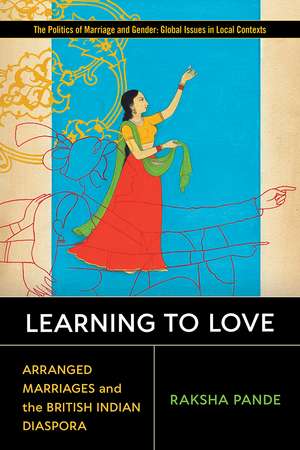Learning to Love: Arranged Marriages and the British Indian Diaspora: Politics of Marriage and Gender: Global Issues in Local Contexts
Autor Raksha Pandeen Limba Engleză Paperback – 19 mar 2021 – vârsta ani
Learning to Love moves beyond the media and policy stereotypes that conflate arranged marriages with forced marriages. Using in-depth interviews and participant observations, this book assembles a rich and diverse array of everyday marriage narratives and trajectories and highlights how considerations of romantic love are woven into traditional arranged marriage practices. It shows that far from being a homogeneous tradition, arranged marriages involve a variety of different matchmaking practices where each family tailors its own cut-and-paste version of British-Indian arranged marriages to suit modern identities and ambitions. Pande argues that instead of being wedded to traditions, people in the British-Indian diaspora have skillfully adapted and negotiated arranged marriage cultural norms to carve out an identity narrative that portrays them as "modern and progressive migrants"–ones who are changing with the times and cultivating transnational forms of belonging.
Preț: 282.71 lei
Nou
Puncte Express: 424
Preț estimativ în valută:
54.10€ • 56.62$ • 45.03£
54.10€ • 56.62$ • 45.03£
Carte indisponibilă temporar
Doresc să fiu notificat când acest titlu va fi disponibil:
Se trimite...
Preluare comenzi: 021 569.72.76
Specificații
ISBN-13: 9780813599632
ISBN-10: 0813599636
Pagini: 154
Ilustrații: 1 figure, 1 table
Dimensiuni: 152 x 229 x 10 mm
Greutate: 0.23 kg
Editura: Rutgers University Press
Colecția Rutgers University Press
Seria Politics of Marriage and Gender: Global Issues in Local Contexts
ISBN-10: 0813599636
Pagini: 154
Ilustrații: 1 figure, 1 table
Dimensiuni: 152 x 229 x 10 mm
Greutate: 0.23 kg
Editura: Rutgers University Press
Colecția Rutgers University Press
Seria Politics of Marriage and Gender: Global Issues in Local Contexts
Notă biografică
RAKSHA PANDE is a lecturer in the School of Geography, Politics and Sociology at Newcastle University in the UK.
Cuprins
Series Foreword by Péter Berta
Preface and Acknowledgments
1 The Politics of Marriage and Migration in Postcolonial Britain
2 Becoming Modern and British: Enacting Citizenship through Arranged Marriages
3 Continuing Traditions as a Matter of Arrangement
4 Becoming a “Suitable Boy” and a “Good Girl”
5 Learning to Love
6 The Ties That Bind: Marriage, Belonging, and Identity
7 Conclusion
References
Index
Preface and Acknowledgments
1 The Politics of Marriage and Migration in Postcolonial Britain
2 Becoming Modern and British: Enacting Citizenship through Arranged Marriages
3 Continuing Traditions as a Matter of Arrangement
4 Becoming a “Suitable Boy” and a “Good Girl”
5 Learning to Love
6 The Ties That Bind: Marriage, Belonging, and Identity
7 Conclusion
References
Index
Recenzii
"Marriage never went out of fashion, certainly among South Asians, though its forms, culture, and politics were never static. Learning to Love gives us a fine grained narration of fluid, changing practices and negotiations shaping ‘arranged marriage’ and intimacy through the voices of two generations of British Indians. Raksha Pande uncovers their making of culture, tradition, choice, modernity, and claims to citizenship contesting the stereotypes that prevail in the ‘west’."
"Amidst rising anti-immigrant sentiment, Learning to Love is a welcome intervention into entrenched, nationalist discourses of ‘arranged marriage’ that present it as anachronistic and utterly different from love marriage. Pande highlights the hopes and strategies of British-Indians, young and old, who talk of ‘rishta,’ matchmaking, intergenerational negotiation, modernity, and falling in love with the right person. A breath of fresh air!"
"Theoretically robust, lucid in style, and presented in an accessible manner. It is a welcome addition to the literature on marriage and spousal selection in general and diasporic marriages in particular. It will be of interest to scholars in the domain of geography, social anthropology, sociology, and gender studies working on questions of diaspora, marriage migration, and (informal) citizenship and anyone interested in the theme of marriage and transnational lives."
Descriere
Learning to Love explores the everyday marriage narratives of the British-Indian diaspora. It unpacks the phenomenon of arranged marriages beyond its pejorative stereotypes by highlighting the diversity of interpersonal and emotional negotiations involved in their practice. Using in-depth ethnographic description, the book shows that far from being a homogeneous tradition, arranged marriages involve a variety of different matchmaking practices modified to suit modern diasporic identities.















